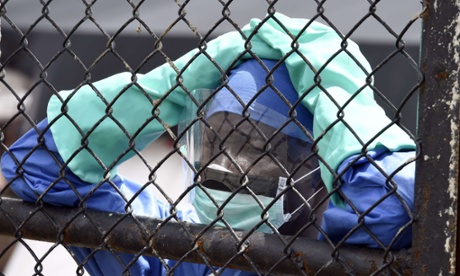Ashoka Mukpo, a freelance cameraman for NBC News in Liberia, will be treated at specialised isolation unit

A plane carrying an American photojournalist who contracted Ebola while working in Liberia landed on Monday in Nebraska, where he will undergo treatment for the deadly disease.
The specially equipped plane Ashoka Mukpo landed at Eppley airfield in Omaha at around 7.30am on Monday. An ambulance was waiting to take him to the Nebraska Medical Center’s specialized isolation unit, which is about a 20-minute ride from the airport.
Mukpo was working in Liberia as a freelance cameraman for NBC News when he became ill last week.
He is the fifth American to return to the United States for treatment since the start of the latest Ebola outbreak, which the World Health Organization estimates has killed more than 3,400 people. Meanwhile, a Liberian man with Ebola who started showing symptoms while visiting the US is in critical condition at a Dallas hospital.
The Nebraska hospital’s biocontainment unit was created in 2005 specifically to handle this kind of illness, Dr Phil Smith, who oversees the unit, said in a news release on Friday.
“We are ready, willing and able to care for this patient,” Smith said. “We consider it our duty to give these American citizens the best possible care we can.”
Mukpo’s father, Dr Mitchell Levy, told NBC Sunday that his son was “counting the minutes” until he could leave Liberia, but that he was not feeling that ill Sunday. Levy said the family was travelling from Rhode Island to Nebraska.
Doctors at the isolation unit – the largest of four nationwide – will evaluate Mukpo before determining how to treat him. They said they will apply the lessons learned while treating American aid worker Rick Sacra in September. Sacra was successfully treated in the Nebraska unit and was allowed to return to his home in Massachusetts after three weeks, on 25 September.
Sacra received an experimental Tekmira Pharmaceuticals drug called TKM-Ebola, as well as two blood transfusions from another American aid worker who recovered from Ebola at an Atlanta hospital. The transfusions are believed to help a patient fight off the virus because the survivor’s blood carries antibodies for the disease. Sacra also received supportive care, including IV fluids and aggressive electrolyte management.
In Dallas, another man who recently traveled to the US from Liberia was listed in critical condition on Sunday. Thomas Eric Duncan has been hospitalized at Texas Health Presbyterian Hospital since 28 September. Dr. Tom Frieden, director of the federal Centers for Disease Control and Prevention, said he was aware that Duncan’s health had “taken a turn for the worse”, but he declined to describe Duncan’s condition further.
The virus that causes Ebola is not airborne and can only be spread through direct contact with the bodily fluids – blood, sweat, vomit, feces, urine, saliva or semen – of an infected person who is showing symptoms.
Duncan arrived in Dallas on 20 September and fell ill a few days later. Officials say 10 people definitely had close contact with Duncan and a further 38 may have been around him when he was showing symptoms of the disease.
Before he was admitted to the hospital, Duncan stayed with Louise Troh, her 13-year-old son and two nephews in their northeast Dallas apartment. The family has been kept in isolation in an undisclosed location since Friday and a hazardous materials crew has twice decontaminated their home. No one in the family has developed Ebola symptoms.
On Sunday, Troh told the Associated Press that she was afraid the crew might damage or destroy some irreplaceable keepsakes that she was forced to leave at the apartment, including photographs and recordings of her daughter, a singer, who died in childbirth.
“If they throw out her picture, her recordings, I’ll be hurt. Her live CD’s in there. That’s all I have to show her children in the future. I don’t want to miss it,” she said in a phone interview.
